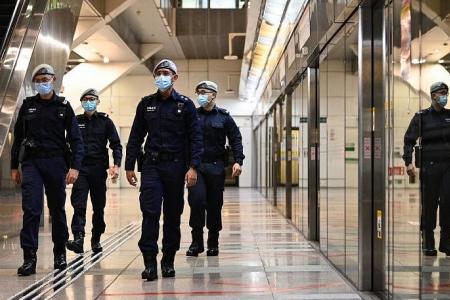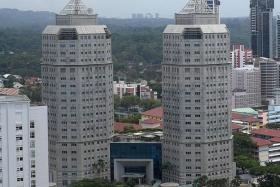2 in 5 would report if loved ones show radicalisation signs; S’pore remains terrorism target: ISD
About 37 per cent, or less than 2 in 5, of Singapore citizens and permanent residents, would contact the authorities if they believed their loved ones were displaying signs of radicalisation, a recent Ministry of Home Affairs survey has found.
This comes even as 70 per cent of the 2,004 Singapore citizens and permanent residents aged 15 and above surveyed said they were generally alert and would keep a lookout for suspicious behaviours or items when in a public place.
The findings from the survey, conducted from October to December 2022, come amid an assessment by authorities here that while Singapore has no imminent terror threat, it continues to be a target of terrorist elements.
The Internal Security Department (ISD) said on Monday in its annual terrorism threat assessment that youth radicalisation is a growing concern here, with social media and gaming platforms being used as channels for recruitment into terror groups.
Those getting radicalised by groups such as the Islamic State in Iraq and Syria (ISIS) in Singapore are also getting younger.
Since 2015, 49 self-radicalised individuals, comprising 37 Singaporeans and 12 foreigners, have been issued ISA Orders.
In the same period, 11 self-radicalised Singaporean youth aged 20 or below have been dealt with under the Internal Security Act. Of the four cases dealt with since the last terrorism threat assessment in July 2022, three of them are young people.
The youngest detainee, 15, was detained in December 2022. The Al-Qaeda and ISIS supporter wanted to establish an Islamic caliphate through violence, as he considered conducting knife attacks against non-Muslims and becoming a suicide bomber.
ISD said that most of the self-radicalised individuals detected in Singapore were influenced by Islamist extremist narratives, such as those propagated by ISIS and Al-Qaeda.
“These narratives tap underlying grievances to justify certain radical beliefs. For example, one ISIS narrative espouses that Islam is under siege by the West, and legitimises violence as a means to redress alleged injustices done to Muslims,” it added.
ISD also noted that ISIS’ territorial and leadership losses have not diminished its appeal to this audience, many of whom consume a diet of violent, apocalyptic narratives from social media.
“There exists an online eco-system of ISIS supporters, who circulate and recycle these narratives and facilitate the radicalisation of like-minded individuals across borders,” said ISD.
ISD added that social media and online gaming platforms have featured prominently in recent local ISA cases as channels of radicalisation.
The three youngsters who were dealt with in the past year were all radicalised by ISIS propaganda online. They also became acquainted through the same extremist social media channel.
In private conversations online, they shared their radical beliefs and support for terrorist groups and discussed measures to conceal their online activities.

A 16-year-old, who was issued a restriction order in January, created an ISIS propaganda video using footage from the popular online game Roblox.
“While the platforms themselves are innocuous, terrorists and extremists have co-opted their features for recruitment and radicalisation,” it added.
There is a ready source of extremist material on social media replicated on various online platforms, which are easily accessible, ISD noted.
Social media also provide easy access to sermons of radical or segregationist foreign preachers, entrenching intolerant views that can serve as a precursor to radicalisation.
In each of the recent ISA cases, the self-radicalised individuals had spent significant amounts of time online, imbibing sermons of radical preachers such as Ahmed Deedat, Zakir Naik, and Anwar Al-Awlaki.
Social media and online gaming platforms also enable like-minded individuals to connect across borders, forming a “virtual caliphate” where they can propagate their support for terrorist groups, and potentially, violent actions, said ISD.
On why youth are susceptible and vulnerable to radical influences, ISD said they are developing a sense of identity and searching for a sense of belonging and personal significance. Extremists also present a world view that is structured and dichotomous, which could be more appealing to the young.
They also tend to be more prone to emotional thinking, said ISD.
“Extremist narratives that induce feelings of anger, fear, pride and guilt to persuade are thus likely to find greater resonance. Youth are more likely to show a higher proclivity for sensation-seeking and risk-taking, which could induce them to act on their emotions,” it added.
In the context of radicalisation, youth are hence more prone to engaging in negative and extreme responses towards diverse environmental stressors – including the pursuit of violent, extremist causes.
ISD also noted that lone actors have turned to easily available weapons such as knives to carry out their attacks.
In the case of Muhammad Irfan Danyal Mohamad Nor, 18, who was detained in December 2022, he had bought a knife from a convenience store in preparation for his attacks against non-Muslims including in dark alleys. The teenager had also downloaded a C4 bomb-making manual, intending to construct an explosive device.
While Singapore has stringent laws on the use of firearms, explosive precursors as well as flammable materials, perpetrators could pivot towards other available means for conducting terrorist attacks, such as knives, said the ISD.
Aside from radicalised individuals, the authorities are also aware that Singapore remains a potential source of funds for terrorists and terrorist organisations abroad, ISD said.
Since 2015, there have been 13 convictions under the Terrorism (Suppression of Financing) Act, comprising three Singaporeans and 10 foreigners. These cases mainly involved funds being collected or raised in Singapore that had been transferred or were going to be moved in support of terrorists and terrorist activities abroad.
There have been no prosecutions of terrorist financing offences in Singapore in the past year, but as a global financial centre and a transport hub with a significant migrant workforce, Singapore remains a potential source of funds for terrorists and terrorist organisations abroad, said ISD.
“The global threat from terrorism and radicalisation persists. Singapore and Singaporeans are not immune,” ISD added. .
“Our strongest defence is our collective vigilance, preparedness, resilience and unity, along with a zero-tolerance approach to those who seek to conduct or finance terrorist acts, or propagate extremist rhetoric.”
Get The New Paper on your phone with the free TNP app. Download from the Apple App Store or Google Play Store now


